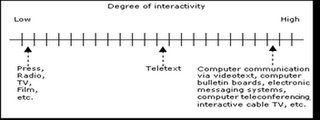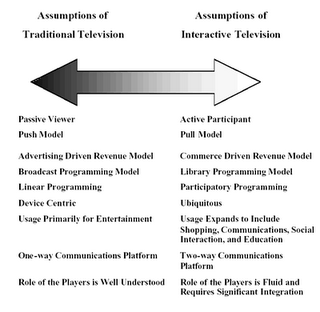Definitions of Interactive Television
Defining interactive media is not straight-forward. The literature in the field of education has, perhaps, the longest history of defining interactive media because the good ol' A/V folks were quick to jump on computers and interactive videodiscs, to name just two, when they first came ouf. Suffice it to say, all communication media have the potential to be employed for educational purposes and that certainly is and will be the case with interactive television. But first, how do we define interactivity.
Interactivity is not binary, but is instead a continuum from limited interactivity to full emersion (e.g., holography in the future not unlike the Holodeck on Star Trek: Next Generation (this is a given, the only question is how long it will take for this form of interactive "television" to move from defense department contracts to the general public; think of airline simulators for military pilots followed by simulators for civilian pilot training).
Interactivity can also be depicted graphically. The following depiction comes froma book authored by the late Ev Rogers (1986).

Georgia Tech MA graduate student Karyn Y. Lu (2005) says:
Interactive television (iTV), or enhanced television (eTV), is any television or video programming that incorporates enhanced content or some style of user interactivity, for example, providing synchronized trivia content during a broadcast, allowing viewers to vote on the outcome of a show, or digitally recording video onto a hard drive so viewers can time-shift while watching a program. ITV is also used as an umbrella term to cover the convergence of television with digital media technologies such as computers, personal video recorders, game consoles, and mobile and wireless devices, enabling user interactivity.
Lu continues with this graphical representation of traditional (linear) television versus interactive television:

Source: http://idt.gatech.edu/ms_projects/klu/lu_karyn_y_200505_mast.pdf accessed 21 November 2006.
The business college at the University of Greece in Athens has a unit devoted to interactive television: http://uitv.info/ which also includes a definition for interactive television:
What is interactive TV?
The answer depends on who is asked: 1) An engineer would assume digital broadcast and return channel, 2) a content producer would refer to interactive graphics and dynamic editing, 3) a media professional would describe new content formats such as betting, interactive storytelling and play-along quiz games, and 4) a sociologistÕs definition would focus on the interaction between people about TV shows. While, none of the above definitions seems to agree with each other, all of them are right.
Interactive TV Systems
Interactive TV systems is a class of computer applications that runs on video and multimedia servers, advanced set-top boxes, home media computers, and mobile phones. Still, the term interactive TV has been a buzzword with as many supporters as opponents. One explanation is that interactivity has been used to describe a technological feature of the media as much as it has been used to characterize a way of using the media. For this reason, the above definition makes an explicit definition between the tehcnological and the social aspects of interactive TV systems.
Source: http://uitv.info/topics/what-is-interactive-tv/ accessed 21 November 2006.
Please send me the citations for other definitions of interactive television. All of us know where to find them: here (with your help).
You may use this content (better still, argue with me!), but please cite my ideas as © 2006, Dr. Bruce Klopfenstein. Find any typos? Don't smite me, let me know!
 Thanks blogger community for solving my mysterious error. I'll hang on to
Thanks blogger community for solving my mysterious error. I'll hang on to 



